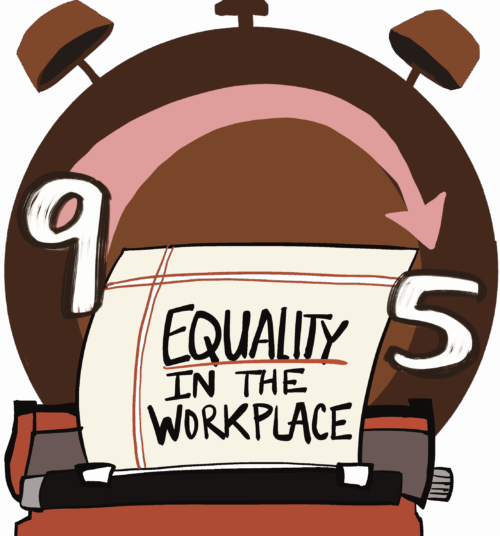On the opening night of “9 to 5: The Musical,” a large audience gathered in Agassiz Theater to watch Harvard’s musical adaptation of the famous 1980 movie. Patricia Resnick and Colin Higgins wrote the original screenplay, which Resnick later adapted into a book (script) with country star Dolly Parton, who also provided the soundtrack and lyrics. The show, which first opened on Broadway in 2009, tells the stories of three women—Violet, Doralee, and Judy—who became unlikely friends in a misogynistic 1970s corporate workplace.
The Harvard edition of this production ran from May 1 to May 4, 2025. The show delighted audiences with its mix of country and pop-style music. Riley Jackson ’27 and Mia Schenenga ’27 co-directed and music directed the production, which starred Independent Design Editor Riley Cullinan ’27 as Violet, Chelsea Bohn-Pozniak ’27 as Doralee, and Grace Hawkins ’28 as Judy. Like many adaptations before it, Harvard’s production of “9 to 5” brought to life the story of three women who take a stand for workers’ rights, showcasing the strength of solidarity and offering an empowering look at women’s experiences in the workplace.
The show began with a prerecorded video of Dolly Parton introducing the show on screens adjacent to the Agassiz stage. The first character viewers were introduced to was Cullinan’s Violet, a widow and single mom. Like many women of her time, Violet felt overlooked and undervalued for the hard work she put into her job. After more than 15 years of service, she was passed up for a promotion due to her boss Hart’s (portrayed by Max Allison ’25) belief that only a male employee could hold respect in a managerial position. Violet’s frustration with this reasoning was all too familiar to women navigating male-dominated spaces.
Bohn-Pozniak’s Doralee was a Texan woman with a bubbly personality and a can-do attitude. At the beginning of the musical, Doralee was socially ostracized by the other women who judged her harshly for her Barbie-like appearance. Doralee earnestly wanted to make friends and was tired of being judged for her looks. During her solo, “Backwoods Barbie,” she conveyed Doralee’s persistent optimism and strength. Doralee’s beauty was met with noticeable contempt from her female coworkers, though it was simply a reflection of her own self-expression and never meant for anyone’s approval but her own. Rather than serving as a weapon to divide women in the workplace, her beauty should have been seen as a source of empowerment.
Judy, a recent divorcee and former housewife, was thrust into the uncomfortable reality of entering the workforce. Her struggle with low self-esteem was clear in the uncertainty and nervousness in Hawkins’ voice. As the story unfolded, Judy spoke and moved with increasing purpose and confidence, especially evident when she took an active role in the plan to kidnap Hart. Empowered by her newfound independence and confidence, she eventually wrote “Life Without Dick”—a pointed nod to her adulterous ex-husband, coincidentally named Dick (Ben Arthurs ’27).
One of the show’s most memorable moments came from a heartfelt interaction between Doralee and her husband, Dwayne, played by Jared Reuben ’26. When Doralee confided in him about her struggles connecting with the other women in the office, he reassured her with a reminder of their Texan spirit: “We never quit.” Another strong partnership was between Violet and a junior accountant named Joe, portrayed by Arthur Câmara ’28. Using his forensic accounting skills, Joe uncovered that Hart was embezzling from the company—a discovery the three women used to blackmail Hart and preserve the improved conditions they had created. These moments highlighted a key message of the show: when men and women work together as equals, real progress—in relationships and in the workplace—is possible.
It would be remiss not to spotlight a crowd favorite—Roz, played by Chloe Chao ’27. As Hart’s loyal informant, Roz conspires with him to manipulate the three leads, helping him convince them they’ve accidentally killed him after Violet fears she’s slipped rat poison into his coffee instead of sweetener. Chao’s elaborate dancing in the number “5 to 9” made Roz’s infatuation with Hart unmistakable, as she comically lamented not being able to see him outside of work hours. The audience erupted with laughter when Roz led a brigade of women with matching bob wigs in a unified dance.
Once the three leads became aware of their shared struggles, they formed a strong bond and worked together to champion progressive workplace reforms—efforts that led to Violet’s promotion to CEO and Hart’s ironic “promotion” to an executive role in Bolivia, where he was ultimately kidnapped again.
The zany events of the musical were brought to life by a lively, well-coordinated orchestra, led by Jackson, Schenenga, and music director Preston Bushnell ’26. The pit’s performance drove the plot forward, enriching each scene to complement the actors. Additional team members included choreographers Paola Lee-Vega ’26 and Benjamin Walter ’26, stage manager Megan Degenhardt ’26, technical producer Haley Stark ’25, and the entire production crew, whose contributions ensured the show’s success.
“9 to 5: The Musical” resonates with the struggles of workers both today and at the time of the original film’s release. More than just entertaining, it offered students a powerful reminder of the ongoing fight for women’s rights and workers’ rights—issues that remain as relevant as ever.
Adedoyin Adebayo ’26 (aadebayo@college.harvard.edu) considers being a corporate employee or a country singer to be good alternative career choices.

